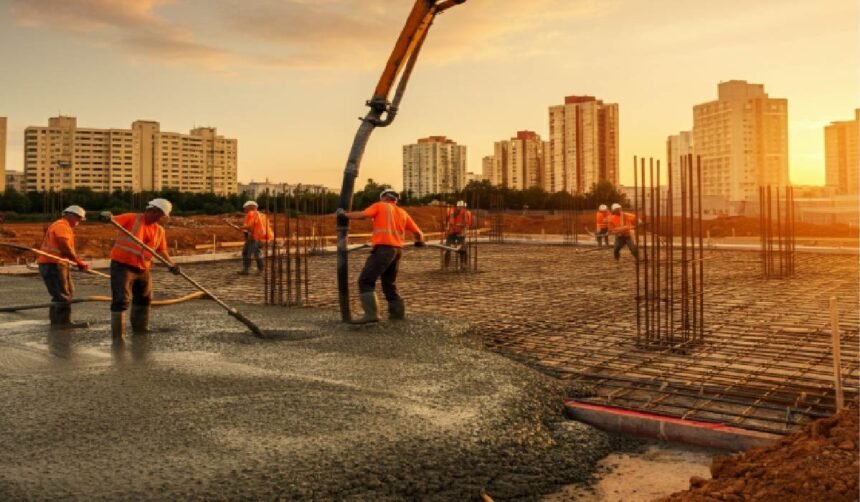When it comes to industrial construction projects, the foundation literally determines everything that follows. Your facility’s concrete work isn’t just about pouring and finishing—it’s about creating a base that can withstand heavy machinery, constant traffic, and decades of operational demands. For businesses in Fort Wayne, Indiana, choosing the right industrial concrete contractor makes the difference between a foundation that lasts and one that becomes a costly problem down the road.
Industrial concrete work requires specialized expertise that goes far beyond residential or commercial projects. The stakes are higher, the requirements more demanding, and the margin for error virtually nonexistent. Whether you’re building a new manufacturing facility, expanding warehouse operations, or upgrading existing industrial spaces, understanding what sets quality industrial concrete contractors apart can save your business significant time, money, and headaches.
What Makes Industrial Concrete Different
Industrial concrete projects operate under completely different parameters than standard construction. The concrete must handle extreme loads from heavy machinery, forklifts, and industrial equipment that can weigh thousands of pounds. These surfaces endure constant traffic patterns, chemical exposure from industrial processes, and temperature fluctuations that would quickly damage standard concrete installations.
Load-Bearing Requirements: Industrial facilities often house equipment that creates concentrated loads far exceeding typical building codes. Manufacturing equipment, storage systems, and heavy vehicles demand concrete that can distribute these loads effectively without cracking or settling.
Chemical Resistance: Many industrial environments expose concrete to oils, acids, cleaning chemicals, and other substances that can deteriorate standard concrete over time. Industrial-grade concrete often incorporates special additives and sealers to resist chemical damage.
Durability Standards: While residential concrete might need to last 20-30 years, industrial concrete should perform reliably for 50 years or more. This longevity requirement influences every aspect of the project, from mix design to installation techniques.
Key Services from Fort Wayne Industrial Concrete Contractors
Foundation Systems
Industrial foundations require precise engineering to handle the specific loads and requirements of each facility. Contractors specializing in industrial concrete Fort Wayne, IN projects understand local soil conditions, weather patterns, and building codes that affect foundation performance.
Deep foundations may be necessary for heavy manufacturing equipment, while shallow foundations work well for warehouse and distribution centers. The contractor should evaluate your specific needs and recommend the appropriate foundation system based on soil analysis, equipment specifications, and long-term operational plans.
Floor Systems and Slabs
Industrial floor systems must withstand constant traffic from heavy equipment while maintaining level surfaces for operational efficiency. Different areas of your facility may require different concrete specifications—production areas need chemical resistance, while loading docks require enhanced durability for truck traffic.
Contractors often recommend specific concrete mixes, reinforcement patterns, and surface treatments based on your operational requirements. Joint placement and sealing become critical factors in preventing cracks and maintaining structural integrity over time.
Specialized Industrial Applications
Many industrial projects require specialized concrete applications that standard contractors cannot handle effectively. This might include:
Containment Systems: Secondary containment for chemical storage, fuel systems, or waste management requires concrete that meets specific environmental regulations and performance standards.
Equipment Pads: Precision concrete pads for heavy machinery must be perfectly level and properly anchored to prevent vibration and ensure operational accuracy.
Loading and Unloading Areas: These high-traffic zones need enhanced concrete specifications to handle constant truck traffic and loading equipment without deterioration.
Choosing the Right Contractor in Fort Wayne
Experience with Industrial Projects
Not all concrete contractors have experience with industrial applications. Look for contractors who can demonstrate successful completion of projects similar to yours in size, complexity, and operational requirements. Ask for references from other industrial clients and visit completed projects when possible.
The contractor should understand industrial building codes, environmental regulations, and safety requirements that apply to your specific industry. This knowledge prevents costly delays and ensures your project meets all necessary standards.
Technical Capabilities
Industrial concrete work often requires specialized equipment and techniques that residential contractors don’t possess. Your contractor should have access to:
- Heavy-duty concrete pumps for large pours
- Laser-guided screeding equipment for precise leveling
- Specialized finishing tools for industrial surface requirements
- Testing equipment to verify concrete strength and quality
Project Management and Scheduling
Industrial projects often operate under tight deadlines with significant costs associated with delays. Your contractor should provide detailed project schedules and have systems in place to manage potential issues before they impact your timeline.
Communication becomes especially important when concrete work must coordinate with other trades, equipment installation, or operational requirements. The contractor should assign dedicated project managers who understand industrial construction timelines and can adapt to changing requirements.
Quality Control and Testing
Industrial concrete projects require rigorous quality control measures throughout the construction process. This includes testing of materials before delivery, monitoring of placement conditions, and verification of final strength and durability characteristics.
Material Testing: Concrete mixes should be tested for compressive strength, workability, and any special performance requirements specific to your application. The contractor should provide documentation of all testing results.
Installation Monitoring: Weather conditions, placement techniques, and curing procedures all affect final concrete performance. Quality contractors monitor these factors continuously and adjust procedures as needed to ensure optimal results.
Final Verification: After completion, industrial concrete should undergo final testing to verify that it meets all specified requirements. This documentation becomes important for warranty purposes and future maintenance planning.
Maintenance and Long-Term Performance
Quality industrial concrete installations require minimal maintenance when properly designed and installed. However, understanding maintenance requirements helps extend service life and maintain operational efficiency.
Regular inspection programs can identify minor issues before they become major problems. The contractor should provide guidance on appropriate maintenance procedures and schedules based on your specific operational requirements and environmental conditions.
Proper sealing and joint maintenance prevent water infiltration and chemical damage that can compromise structural integrity over time. Industrial facilities should establish maintenance protocols that address these critical areas systematically.
Making Your Investment Count
Industrial concrete represents a significant investment in your facility’s long-term performance and operational efficiency. Working with experienced contractors who understand the unique requirements of industrial concrete Fort Wayne, IN projects ensures that your investment delivers maximum value over its service life.
The right contractor brings together technical expertise, quality materials, and proven installation techniques to create concrete systems that support your business operations for decades. Take time to evaluate potential contractors thoroughly, review their industrial project experience, and verify their ability to meet your specific requirements.
Your facility’s concrete foundation sets the stage for everything that follows. Choose contractors who understand this responsibility and have the experience to deliver industrial concrete systems that truly support your business success.
Contact Info:
Name : Crystal Creek Concrete
Address : 20952 Ward Rd, Woodburn, IN 46797
Phone: +1 (260) 241-4936
Email: loren@crystalcreekconcrete.com
Website: https://crystalcreekconcrete.com/









